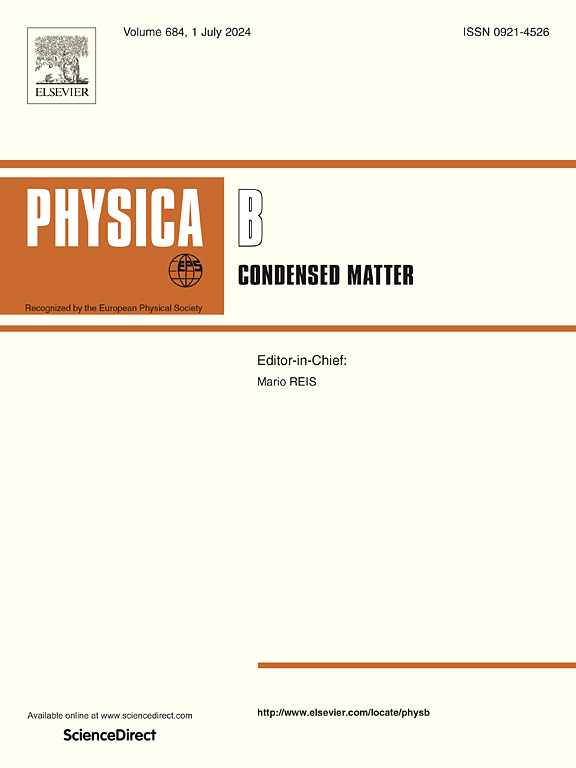双特性发射的Dy1-xTbx-datrz MOF荧光强度比温度传感
IF 2.8
3区 物理与天体物理
Q2 PHYSICS, CONDENSED MATTER
引用次数: 0
摘要
采用DMF溶液溶剂热法成功合成了一系列双镧系金属有机骨架(Dy1-xTbx-datrz mfs),并通过XRD和FT-IR图对其进行了验证,SEM观察进一步揭示了其为规则块晶体结构。随后,在350 nm激发下,所有Dy1-xTbx-datrz mof的固态发光光谱均显示出Dy3+和Tb3+的双特征发射峰。同时发现了与单金属发光MOF相似的浓度猝灭效应,其中Dy0.5Tb0.5-datrz的发射强度最强。值得注意的是,对Dy0.5Tb0.5-datrz的比值-计量荧光感温性能和热循环稳定性进行了研究,在293K-473K期间,Dy0.5Tb0.5-datrz的灵敏度值(Sr)在0.2737% ~ 0.4421% K−1之间,δT值在0.0300 ~ 0.0485K之间,具有良好的热循环稳定性。因此,具有双特征发射的Dy0.5Tb0.5-datrz具有比值-计量荧光温度传感的潜力。本文章由计算机程序翻译,如有差异,请以英文原文为准。
Fluorescence intensity ratio temperature sensing of Dy1-xTbx-datrz MOF with dual characteristic emission
A series of dual-lanthanide metal-organic frameworks (Dy1-xTbx-datrz MOFs) have been synthesized successfully via solvothermal method using DMF solution and confirmed by XRD and FT-IR patterns, which were further revealed as the structure composed of regular block crystals by SEM observation. Subsequently, the solid-state luminescence spectra of all the Dy1-xTbx-datrz MOFs showed the dual characteristic emission peaks of Dy3+ and Tb3+ under the excitation at 350 nm. Meanwhile, a concentration quenching effect was found like monometallic luminescence MOF, among which Dy0.5Tb0.5-datrz exhibited the strongest emission intensity. Notably, the ratio-metric fluorescence temperature sensing performance and thermal cycle stability of Dy0.5Tb0.5-datrz were investigated, of which the sensitivity value (Sr) ranged from 0.2737 %K−1 to 0.4421 %K−1 and δT value varied between 0.0300K and 0.0485K during 293K–473K, combined with a good thermal cycle stability. Therefore, Dy0.5Tb0.5-datrz with dual characteristic emission has the potential for ratio-metric fluorescence temperature sensing.
求助全文
通过发布文献求助,成功后即可免费获取论文全文。
去求助
来源期刊

Physica B-condensed Matter
物理-物理:凝聚态物理
CiteScore
4.90
自引率
7.10%
发文量
703
审稿时长
44 days
期刊介绍:
Physica B: Condensed Matter comprises all condensed matter and material physics that involve theoretical, computational and experimental work.
Papers should contain further developments and a proper discussion on the physics of experimental or theoretical results in one of the following areas:
-Magnetism
-Materials physics
-Nanostructures and nanomaterials
-Optics and optical materials
-Quantum materials
-Semiconductors
-Strongly correlated systems
-Superconductivity
-Surfaces and interfaces
 求助内容:
求助内容: 应助结果提醒方式:
应助结果提醒方式:


